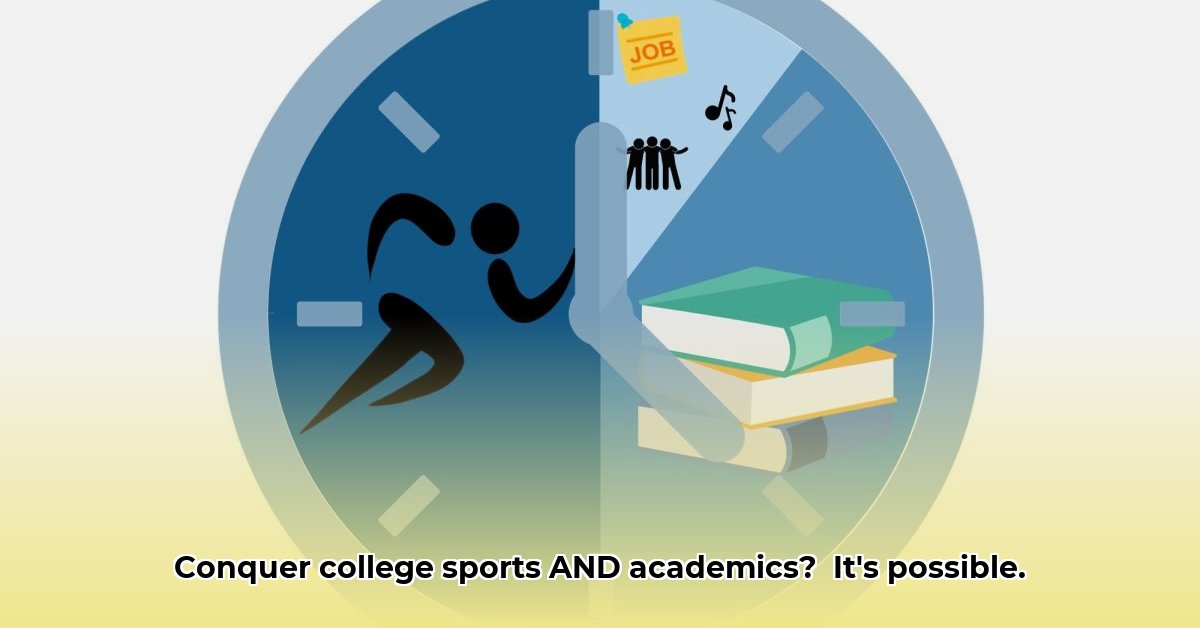Being a student athlete is tough. It’s a balancing act between hitting the books and hitting the field (or court, or pool!). Feeling stressed about keeping up with everything? You’re not alone. This guide will show you how top student athletes manage their time, and how you can too. We’ll look at common time management mistakes and give you practical, step-by-step strategies to conquer your schedule and excel in both academics and sports. It’s more than just making a to-do list; it’s about building a winning system that works for you now and sets you up for success in the long run. Let’s get you organized and ready to win on and off the field! For more student time management tips, check out this helpful guide: student time management.
Mastering Student Athlete Time Management: Excel in Sports & Academics
Juggling school and sports? It’s a tough act, but totally doable! This isn’t about cramming everything in; it’s about smart planning so you shine both on the field and in the classroom. Let’s craft a winning game plan for your time, enhancing athletic time management.
Understanding the Student-Athlete Balancing Act
Being a student-athlete is awesome – the excitement of games, the team spirit, and the challenge of learning. But honestly, it’s a whirlwind! Effective time management isn’t just about fitting everything in; it’s about carefully making choices to excel in both areas. Think of it as a high-stakes game, and you’re the star player, ready to strategize your way to victory. How can student athletes effectively manage the pressures of balancing academics and sports while maximizing their potential in both realms?
Creating Your Winning Schedule: The Weekly Game Plan
Your weekly schedule is your playbook. It’s the roadmap that guides you to success, promoting efficient scheduling. A well-organized plan prevents feeling overwhelmed and ensures you’re prepared for practices, games, tests, and everything in between. First, pencil in the non-negotiables: classes, practices, competitions, and important appointments. Then, strategically add in study time, meals, and essential downtime. Are you a morning person? Tackle your toughest academic assignments when you’re most focused.
Step-by-Step to Schedule Success:
- Choose your weapon: Select a planner, digital calendar, or app to organize your week. There are tons of great options out there – find one that clicks with you, assisting with athletic schedule management. Popular choices include Google Calendar, Trello, or even a classic paper planner.
- Prioritize: What absolutely must get done this week? Focus your energy there. Rank your tasks and commitments in order of importance.
- Study Time: Block out specific times for studying, including short breaks to refresh. Don’t forget to schedule time for reviewing material. Active recall and spaced repetition are effective study techniques.
- Game On!: Allocate time for practices, training, recovery (crucial!), and travel to and from events. Don’t forget to factor in pre-game preparation and post-game analysis.
- Rest and Recharge: Schedule time for relaxation, hobbies, and socializing with friends and family. This is essential for preventing burnout and maintaining overall well-being.
Prioritization Power: The 80/20 Rule
Not all tasks are equal. The 80/20 rule (also known as the Pareto Principle) suggests that 80% of your results come from 20% of your efforts, crucial for prioritizing tasks. Identify those crucial 20% – the tasks that will make the biggest difference in your academic and athletic performance – and prioritize them above all else.
Example: If a major exam looms, prioritize studying over less critical assignments. It’s about focusing your energy where it counts most. If you have a particularly challenging practice, ensure you get adequate sleep and nutrition beforehand.
Time Blocking: Mastering Your Minutes
Time blocking is your secret weapon, enhancing athletic focus. Allocate specific time slots for different activities. Treat these blocks like appointments you can’t miss. This boosts your concentration and minimizes distractions.
Here’s a sample schedule – adapt it to fit your own rhythm:
| Time | Activity | Notes |
|---|---|---|
| 6:30 AM – 7:00 AM | Wake up, Hydrate, Light Stretch | Prepare your body for the day |
| 7:00 AM – 8:00 AM | Morning workout | High intensity, efficient workout |
| 8:30 AM – 12:30 PM | Classes | Active participation and note-taking |
| 12:30 PM – 1:00 PM | Lunch | Nutritious meal is a must |
| 1:00 PM – 2:00 PM | Quick Review | Fuel up and check notes from the morning |
| 2:00 PM – 4:00 PM | In-depth Study (History Exam) | Focused study session, utilize different techniques |
| 4:30 PM – 6:30 PM | Team Practice | Full engagement, listen to your coach |
| 7:00 PM – 8:00 PM | Dinner and Chill | Relax and recharge |
| 8:30 PM – 10:00 PM | Light Review/Homework | Review and plan for the next day |
| 10:30 PM | Bedtime | Aim For 7-9 hours of sleep |
Tap into Your Support System: Your Team is Your Tribe
Your support network is invaluable. Talk to your coaches, teachers, and teammates, forming a student athletic community. They offer valuable advice, understanding, and sometimes, flexibility. Need extra help? Seek tutoring or academic advising. Remember, success isn’t a solo sport! Open communication is key to effective time management. Don’t hesitate to ask for help when you need it. Many universities offer mentoring programs specifically for student-athletes.
Self-Care: Fueling Your Peak Performance
Self-care isn’t just about relaxation (though that’s important!), fostering athletic mental health. Sufficient sleep, healthy eating, and stress management are crucial. Burnout is a real risk. Prioritize sleep, eat nutritious meals, and schedule time for activities that help you relax and de-stress. It’s an investment in your overall performance – both on and off the field. Techniques like meditation, deep breathing exercises, or spending time in nature can be highly effective.
Adaptability: Rolling with the Punches
Life throws curveballs! Games get rescheduled, exams get moved, and unexpected things happen. Your schedule is a living document, not set in stone. Be ready to adapt and readjust. Flexibility is essential for success. This adaptability is a crucial skill in effective time management, promoting flexible athletic training. Learn to prioritize tasks and adjust your schedule on the fly when necessary.
Review and Refine: Continuous Improvement
Regularly evaluate and adjust your schedule. What’s working well? What needs tweaking? Are you consistently hitting your goals? Make changes to optimize your system. Don’t be afraid to experiment and discover what best suits your needs. Your schedule is a tool, not a cage! Make it work for you. It’s about continuous student athletic improvement. Track your progress and identify areas for improvement.
How to Balance NCAA Division I Athletics and Academics Effectively
Key Takeaways:
- Effective time management is crucial.
- Open communication with coaches and professors is essential.
- Utilizing campus support services is vital.
- Prioritizing mental and physical well-being is non-negotiable.
- Proactive planning and self-advocacy are key for long-term success.
Mastering Your Schedule: The Foundation of Success
Juggling intense athletic training with a demanding academic load feels like trying to ride two wild horses at once, requiring strategic student athletic performance. But you can tame this challenge. The secret? A meticulously planned schedule. Think of it as your game plan, but for life. Start with a realistic weekly calendar. Block out practice times, games, travel, and class schedules. Then, pencil in study time—treat it like another crucial training session.
Pro Tip: Use a digital calendar or planner that syncs across your devices. This helps you stay organized even when on the go. Consider using apps like Google Calendar, Outlook Calendar, or specialized student planner apps. It significantly helps with NCAA athlete organization.
Communication is Key: Building Your Support Network
Don’t be afraid to talk to your coaches and professors. They want you to succeed both on and off the field. Inform them upfront about your commitments. Early communication prevents scheduling conflicts and fosters understanding. This isn’t about making excuses; it’s about responsible planning and teamwork, creating a collaborative student athlete environment.
Actionable Step: Schedule brief meetings with your coaches and professors during the first few weeks of each semester to inform them of your commitments. Provide them with a copy of your athletic schedule. Don’t underestimate the power of this step; it can save you valuable time and stress throughout the semester.
Leveraging Campus Resources: Your Secret Weapon
Your university likely offers a wealth of resources specifically designed for student-athletes. Tutoring services, study halls, academic advising, and even mental health support are all available. Taking advantage of these services isn’t a sign of weakness; it’s a smart strategy for staying ahead. It focuses on the importance of student athlete resources.
Actionable Step: Explore the resources offered by your university’s athletic department and academic support services. Attend introductory sessions and meet with an academic advisor to create a personalized academic plan. Many universities have dedicated academic advisors for student-athletes.
Prioritizing Well-being: The Unsung Hero
Your physical and mental well-being are not luxuries; they’re necessities. Think of them as the fuel that keeps both your academic and athletic engines running smoothly. Burnout is a real risk for student-athletes, preventing NCAA athlete burnout. Prioritizing adequate sleep, proper nutrition, and stress management techniques is essential for preventing burnout. Don’t hesitate to seek support from campus counseling services if needed.
Actionable Step: Incorporate regular exercise (beyond your team training), mindfulness practices (meditation or yoga), and sufficient sleep into your weekly schedule. Aim for at least 7-9 hours of sleep per night.
Long-Term Strategies: Building for the Future
How to balance NCAA Division I athletics and academics effectively isn’t just about surviving each semester; it’s about building a foundation for future success. Develop strong time management skills, communication skills, and advocate for yourself with coaches and professors. Think about your career goals; can your academics enhance your future athletic career? And vice versa?, improving student athlete career strategy.
Actionable Step: Meet with career services to explore potential job opportunities aligning with both your academics and athletic pursuits. Consider leadership roles in student organizations to improve your time management, communication, and networking skills. Research internships and volunteer opportunities that can enhance your resume.
Mastering Time Management for Elite Student Athletes in High-Pressure Environments
Key Takeaways:
- Proactive scheduling is crucial for balancing academics and athletic training.
- Prioritizing tasks effectively maximizes your time.
- Minimizing distractions improves focus and productivity.
- Utilizing technology can streamline your schedule and enhance organization.
- Effective communication with coaches and professors is vital.
- Self-care and stress management prevent burnout.
- Goal setting, both short-term and long-term, provides direction and motivation.
- Adapting your strategies to suit your sport and academic demands is essential for long-term success.
Crafting Your Winning Schedule: The Foundation of Success
Juggling intense athletic training with demanding academics feels like a never-ending race. But what if I told you that mastering time management for elite student athletes in high-pressure environments isn’t about superhuman abilities, but smart strategies? It’s about building a system that works for you, optimizing elite athlete scheduling.
First, create a realistic schedule. Include everything: classes, practices, games, study time, even meals and sleep. Don’t overschedule; leave buffer time for unexpected events. Use a digital calendar or planner—whatever works best for you to keep a visual representation of your weeks. Experiment with different formats to find what suits you best.
Next, prioritize ruthlessly. What absolutely must get done? Tackle those tasks first. Use methods like the Eisenhower Matrix (urgent/important) or simply list things in order of importance. Don’t be afraid to say “no” to commitments that will overwhelm you. Delegate tasks where possible.
Conquering Distractions: Focus Your Energy
Distractions are the enemy of productivity. Identify your biggest time-wasters—social media, friends’ casual calls, etc. Then, actively minimize them, enhancing athletic concentration skills. Turn off notifications, designate specific times for social media, and create a dedicated study space free from interruptions. Consider using website blockers or focus apps to limit your access to distracting websites.
Technology as Your Ally: Smart Tools for Smart Athletes
Technology isn’t just for entertainment, improving athletic tech skills. Calendar apps, task management tools, and even note-taking software can transform how you manage your time. Experiment to discover the tools that integrate best with your workflow; there are numerous options. Explore apps like Asana, Todoist, or Evernote for task management and organization.
Communication is Key: Building Your Support Network
Open communication is essential. Talk to your coaches about your academic commitments. Be honest with your professors about your athletic schedule. A strong support network can make all the difference in navigating unexpected conflicts, nurturing supportive athletic relationships. Schedule regular check-ins with your coaches and professors to discuss your progress and any challenges you may be facing.
The Long Game: Sustainable Time Management Habits
Effective time management isn’t a sprint; it’s a marathon. Consistency is key. Regularly review your schedule, adjust it as needed, and reflect on what’s working and what’s not. This process of continual refinement will help you to master time management for elite student athletes in high-pressure environments and achieve your goals consistently over time. Track your progress and celebrate your successes.
Self-Care: Fueling Your Success
Burnout is a real threat for student-athletes. Prioritize sleep, nutrition, and relaxation techniques, enhancing elite athlete wellness. Remember that taking care of yourself isn’t selfish; it’s essential for peak performance. Schedule time for activities you enjoy; this recharges your batteries and reduces stress levels. Engage in mindfulness practices to manage stress and improve focus.
Effective Time Management Strategies for Student Athletes with Disability Accommodations
Key Takeaways:
- Prioritize tasks using methods like the urgency/importance matrix. This helps you focus on what truly matters.
- Use a planner—digital or paper—to visualize your schedule and commitments. Seeing it all laid out helps you stay organized.
- Set SMART goals (Specific, Measurable, Achievable, Relevant, Time-bound) for both academics and athletics. This keeps you focused and motivated.
- Establish a consistent daily routine. Routine minimizes decision fatigue and maximizes efficiency.
- Learn to say “no” to non-essential commitments. Protect your time and energy for what’s truly important.
- Communicate openly with coaches and professors for scheduling flexibility and support. Collaboration is key.
- Effective Time Management Strategies for Student Athletes with Disability Accommodations: Understand and utilize any accommodations available to you. This might include extended deadlines or alternative testing environments. Don’t hesitate to ask for the help you need.
- Prioritize rest and recovery. Burnout is a real threat. Adequate rest supports both academic and athletic success.
Mastering Your Schedule: Planning for Success
Juggling academics and athletics is a marathon, not a sprint. Effective planning is your secret weapon, assisting student athletes with disabilities. Start by choosing a planner – a digital calendar, a physical planner, or a combination of both. What works best for you? Experiment to find a system that fits your learning style and preferences. Consider using assistive technology to help you stay organized.
Next, break down your commitments. Schedule classes, practices, games, study time, and even downtime. Be realistic. Don’t overschedule yourself. Remember that unexpected things happen; build in some buffer time. Factor in travel time between classes and athletic commitments.
Prioritization: The Art of Saying “No”
You won’t always have time for everything. That’s okay, aiding strategic time allocation. Learn to prioritize. The Eisenhower Matrix (urgent/important) can help. Focus on high-impact activities first. What contributes most to your academic and athletic goals? Saying “no” to less important tasks frees up time for what really matters. Delegate tasks where possible.
SMART Goals: Aiming for Excellence
Setting SMART goals provides direction and motivation, focusing athletes through focused planning strategies. For example, instead of “do well in my history class,” set a SMART goal: “Achieve an A in History 101 by consistently completing all assigned readings and participating in class discussions.” Break larger goals into smaller, manageable steps. Track your progress towards your goals regularly.
The Power of Routine: Consistent Habits
A consistent daily routine minimizes decision fatigue. Establish a regular study schedule, a designated time for athletic training, and time for rest and relaxation. This predictability creates structure and allows you to focus your energy. Prepare your meals in advance to save time and energy.
Communication is Key: Building Bridges
Open communication with your coaches and professors is crucial, enabling collaborative communication skills. If you anticipate scheduling conflicts, speak up early! Proactive communication ensures understanding and support. Your coaches and professors want you to succeed. Provide them with documentation of your disability accommodations if necessary.
Effective Time Management Strategies for Student Athletes with Disability Accommodations
Remember, you have rights and resources available to you. Explore disability services at your school, focusing on accommodative athletic resources. They can offer accommodations, such as extended test times, note-takers, or assistive technology. Don’t hesitate to advocate for your needs. These accommodations are designed to promote equal access to education and athletic opportunities. You deserve to thrive! Familiarize yourself with your rights under the Americans with Disabilities Act (ADA).
Balancing Act: Rest and Recovery
Rest and recovery are not optional; they are essential, improving inclusive athletic wellness. Adequate sleep, healthy eating, and stress management techniques are critical to prevent burnout. A tired mind and body cannot perform at their peak. Prioritize self-care; it’s an investment in your success. Use adaptive equipment or techniques to minimize physical strain.
- Best Books to Start Meditation for Beginners and Skeptics - February 21, 2026
- Essential Books On Mindfulness For Beginners To Find Calm - February 20, 2026
- Top 10 Books on Meditation to Deepen Your Practice - February 19, 2026













